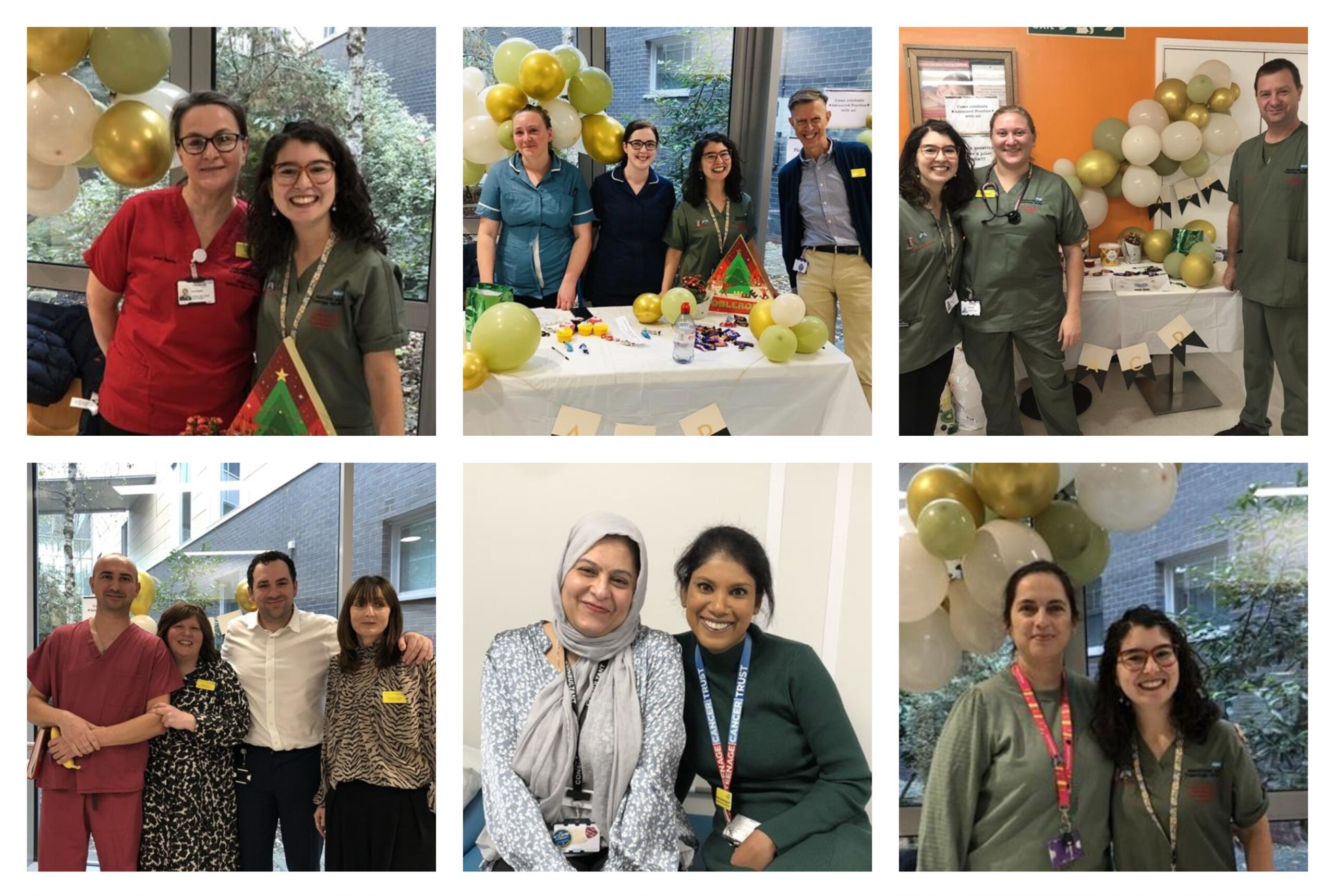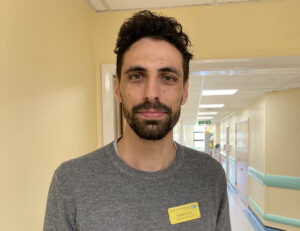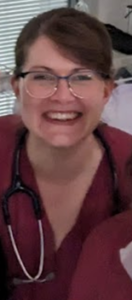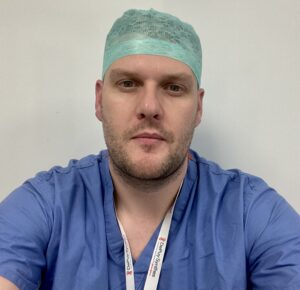
As the world marks Advanced Practice week, we’re celebrating just some of our fantastic Advanced Clinical Practitioners (ACPs)
We’re proud to have over 60 Advanced Practitioners and trainee Advanced Practitioners in our Trust, from a range of professional backgrounds including nursing, pharmacy, paramedics and occupational therapy. They’re all highly educated healthcare professionals, trained to a high standard and working autonomously as part of a team of professionals.
Find out about just some of our ACPs:
Nellie Kumaralingam, Nurse Consultant – Melanoma
Tell us about your career and how you got to be an Advanced Practitioner
As a clinical nurse specialist (CNS) I found I spent a lot of time chasing others to do things for me such as requesting scans/ writing prescriptions/ confirming chemo. At the time I had embarked on a leadership MSc at Kings and decided to change this to AP. I had family members asking me why I didn’t just do my medical training instead but I wanted to be a nurse with extended skills rather than a doctor or a doctor wannabe. I got my masters in 2014 and had the clinical experience but I then spent two years gaining experience in leadership/ research/ education before I moved to an ACP post. I used the ACP post to consolidate my learning from my masters and to gain experience in leadership/ research/ education.
From there I was a lead nurse which further developed my leadership/ education skills. I finally moved to a consultant post in 2021 which was seven years after gaining my masters. At this time I also began thinking about a doing a PhD and developed my research question. Once again I have taken my time to develop myself to do a PhD; connecting with potential supervisors, attending training/ study days on preparing to embark on a PhD, getting articles published, developing my research knowledge. I began thinking about embarking on a PhD in 2021 and will apply in 2024/25!
What is your favourite pillar of practice?
I would say that I enjoy the leadership aspect most. I am very patient-orientated and enjoy developing and improving services to ensure they access to the right care at the right time in the right place which is an important aspect of leadership. I don’t think enough importance is given to the four pillars. I know people who have completed their Master’s and then expect to work at ACP/ lead/consultant level without experience in the four pillars. We need more education on this.
Give us an example of something you really want to achieve next in your career, or something you have enthusiastically been working towards?
I am aiming to do a PhD. Currently I am using my leadership skills and clinical knowledge to develop the melanoma service within MTW and across Kent. Networking and connecting with people who don’t work within cancer is important.
What advice would you give to someone who would like to pursue this career path?
Take your time! Don’t be in a rush because you see other people moving ahead of you. Think about how you are going to make a difference to patients. Once you are a consultant you need to be certain in your ability to work autonomously and make decisions. This is your career and registration.
Ricardo Alves, Lead Clinical Endoscopist
 Tell us about your career and how you got to be an Advanced Practitioner
Tell us about your career and how you got to be an Advanced Practitioner
I began my career as a Nurse Endoscopist (now known as Clinical Endoscopist) 8 years ago and I have had the privilege of gaining extensive expertise in this field over that period. As I strove to expand my role, I had to acquire new knowledge and skills. The MSc in Advanced Clinical Practice provided a balanced and healthy platform for this growth, which in turn, enabled a strong transition into the role of an Advanced Practitioner. This educational journey and Trust processes, not only expanded my clinical knowledge, but also instilled the need to commit to the four pillars.
What is your favourite pillar of practice?
All four pillars of practice are integral to my role and provide a healthy balance to the role. But, if I had to choose a favourite, it would be the clinical pillar. Direct patient care has always been my primary focus and motivation. The ability to make a positive impact on patients’ lives by providing advanced and holistic care is incredibly rewarding. Education comes as close second, as the need to shape the next generation greatly impacts patient care.
Give us an example of something you really want to achieve next in your career, or something you have enthusiastically been working towards?
I recently achieved bowel cancer screening accreditation, becoming one of the few clinical endoscopists to do so. It has been a significant accomplishment that I have dedicated the last few years to achieving. Now, at this point in my career, I am aiming to stabilize my role in this new capacity. However, my next goal is to become proficient in serving as faculty in accredited courses. I’ve already taken the initial steps toward this objective, and I am enthusiastic about the opportunities it will provide for educating and mentoring the next generation of endoscopists and contributing to the enhancement of patient care and safety in our field.
What advice would you give to someone who would like to pursue this career path?
My advice is to start by choosing the right specialty, which, in my case, was endoscopy. Begin by learning the fundamentals of your chosen field, mastering the basics. Once you have a solid foundation, take the initiative to go a little above and beyond your role. Engage in activities like conducting audits, contributing to the development of SOPs, actively participating in clinical governance processes, etc. Seek to expand your knowledge, attend conferences, stay updated on the latest advancements. Don’t hesitate to ask questions and seek guidance from experienced clinicians. Another step is to become proactive and be able to anticipate. Show initiative in problem-solving and improving processes within your specialty.
By demonstrating these traits, you’ll not only excel in your current role but also make yourself noticed as a dedicated and innovative member of staff. Success in pursuing a career as an Advanced Care Practitioner requires a commitment to learning, adaptability, and a willingness to take on new challenges. It’s a journey that rewards those who are proactive, eager to learn, and actively contribute to the betterment of patient care and clinical practice.
Emma-Jayne Underdown, Advanced Clinical Practitioner – Emergency Medicine
Tell us about your career and how you got to be an Advanced Practitioner
 I started my career as a staff nurse in Surgery and after 12 months decided to move to Intensive Care. I worked in intensive care for four years and completed my BSc Intensive Care Practice. I later transferred to the Critical Care Outreach team as a band 6 development role, later becoming a Senior Sister in Critical Care Outreach for five years. I decided that I wanted to pursue a career in Advanced Clinical Practice so that I could build upon the autonomous role of outreach and develop a new skill set in a broad specialty, so I chose to apply to work in the Emergency Department.
I started my career as a staff nurse in Surgery and after 12 months decided to move to Intensive Care. I worked in intensive care for four years and completed my BSc Intensive Care Practice. I later transferred to the Critical Care Outreach team as a band 6 development role, later becoming a Senior Sister in Critical Care Outreach for five years. I decided that I wanted to pursue a career in Advanced Clinical Practice so that I could build upon the autonomous role of outreach and develop a new skill set in a broad specialty, so I chose to apply to work in the Emergency Department.
Since 2019, I have completed my MSc in Advanced Clinical Practice and developed a wide range of Emergency Medicine knowledge and skills. Alongside my clinical practice I have an Honorary Senior Lecturer post at Canterbury Christ Church University, where I support the education of trainee ACPs across the county. I also now lead on areas of advancing practice within the Emergency Department.
What is your favourite pillar of practice?
I couldn’t choose my favourite pillar! Clinical practice is at the heart of why I chose to become an ACP and education has always been a huge interest and source of career satisfaction. However, I have had the opportunity to develop my leadership skills with some really exciting projects and innovations and I have enjoyed this area of practice a lot. Being in a position to implement change and improvements for staff and patients has been hugely satisfying and something I continue to enjoy. More recently, I have become more actively involved in research, and building upon the leadership and innovation opportunities, research feels like a next step in supporting this.
Give us an example of something you really want to achieve next in your career, or something you have enthusiastically been working towards?
The next thing I would like to achieve in my career is to work towards Consultant level practice and in particular explore how I can influence wider change and improvements. As part of this and in recent months I have started exploring pathways to undertake my PhD. I am currently networking nationally and exploring gaps in knowledge and practice to decide upon a topic for research.
What advice would you give to someone who would like to pursue this career path?
My advice to anyone wanting to pursue a career in advanced practice is to develop an inquiring mind. Ask questions, learn as much as you can. Always ask “why?”.
Knowledge is power and will help you to develop critical thinking. Reflect upon your practice often and always consider what additional knowledge would have helped…then fill that gap. But mostly, I would say – go for it! It’s a wonderfully varied career pathway with an abundance of opportunities!
Rachel Hutchinson, Advanced Neonatal Nurse Practitioner
Tell us about your career and how you got to be an Advanced Practitioner
 Before going to college, I actually wanted to be a midwife, but then I took a summer job in a children’s nursery and ended up working there for three years. During my time at the nursery I made some very good friends, one of whom had a preterm baby. When visiting them on the neonatal unit, I just knew that neonatal nursing was the job for me.
Before going to college, I actually wanted to be a midwife, but then I took a summer job in a children’s nursery and ended up working there for three years. During my time at the nursery I made some very good friends, one of whom had a preterm baby. When visiting them on the neonatal unit, I just knew that neonatal nursing was the job for me.
I applied to university to do children’s nursing and qualified in 2008, going straight to work as a newly qualified nurse on the tertiary neonatal unit in Brighton. There I learnt all the foundation skills it takes to nurse preterm and unwell term babies and their families; I completed my postgraduate degree and became more experienced in caring for intensive care babies. There was an established team of neonatal ACPs in Brighton and the sister hospital in Haywards Heath; I admired the role from very early on in my career due to its holistic nature and aspired to take that pathway. I gained clinical as well as some education and audit experience before starting my ACP training in 2017 at the University of Southampton.
What is your favourite pillar of practice?
Clinical practice and education – my role as a Neonatal ACP is generally very “hands on” and extremely varied: from routine newborn examinations to managing preterm deliveries; and from feeding advice to intubations. No two days are ever the same! As I am becoming more experienced, I have started to be able to provide teaching for my colleagues, with my main expertise being in newborn life support (NLS) and physical examination of the newborn.
Give us an example of something you really want to achieve next in your career, or something you have enthusiastically been working towards?
I came to MTW as I believed it offered the opportunity to focus on the education, leadership and research pillars as well as continuing to develop my clinical skills. I am slowly taking on responsibilities within the simulation team and completing my Good Clinical Practice training so that I can become more active within the research team. I am also undertaking the Exceptional Leaders course provided by the Trust. I have been kept very busy since joining MTW! In the future, I would like to experience neonatal transport as an ACP.
What advice would you give to someone who would like to pursue this career path?
Talk to others that have completed the course in the speciality that you want to do and find out their lived experience of the training and the role. It is a good idea to be prepared – the course can be very consuming and those that have been there before you will probably have some excellent tips to help you on your way. The first year after qualifying is a steep learning curve and you consolidate your new knowledge and skills, so make sure you utilise your support network around you; both personal and professional.
Matt Baker, Surgical Care Practitioner
 Tell us about your career and how you got to be an Advanced Practitioner
Tell us about your career and how you got to be an Advanced Practitioner
My career started at MTW in 2007 as a student Operating Department Practitioner (ODP). I qualified in 2009 and worked in theatres at Maidstone Hospital until Tunbridge Wells Hospital opened in September 2011. It was here that I developed a passion for Trauma and Orthopaedics.
In 2016 I returned to Maidstone Hospital to re-open the Maidstone Orthopaedic Unit and I was the theatre lead there for four years. In January 2020 I was successfully appointed as a trainee Surgical Care Practitioner (SCP), returning to university and studying towards becoming a qualified SCP which I achieved in June 2022.
What is your favourite pillar of practice?
My favourite pillar of advanced practice would have to be clinical. This area of my practice gives me the most job satisfaction; it involves being hands on and delivering patient care in theatre and outpatient clinics.
Give us an example of something you really want to achieve next in your career, or something you have enthusiastically been working towards?
I’m keen on education and development. The Trauma and Orthopaedics department have recently recruited five new trainee SCPs. I am very much looking forward to welcoming them to our team in the new year and working alongside them as they progress through their training.
What advice would you give to someone who would like to pursue this career path?
I would highly recommend the role of a Trauma and Orthopaedics Surgical Care Practitioner. It gives a great balance of face-to-face patient contact within the outpatient setting and a hands on, practical element within the operating theatres. To have the opportunity to provide an advanced level of high quality, individualised patient care within a dedicated multidisciplinary team, is a privilege.
